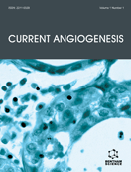Abstract
Vasculogenesis refers to the de novo formation of vessels during embryogenesis, development and tissue repair. Angiogenesis is a biological process by which arteries and veins are developed from pre-existing vessels first developed by vasculogenesis. Both vasculogenesis and angiogenesis processes are also involved in important biological events such as activation, proliferation, migration, and differentiation of endothelial cells. Angiogenesis is also modulated by the interactions of several angiogenic factors, extracellular matrix and medications. Although stimulation of angiogenesis is a favorable process for patients with coronary artery diseases, uncontrollable stimulation of angiogenesis is detrimental in patients with tumor metastasis and organs’ megaly. Recent advances in cancer and ophthalmologic research provided better understanding of neovascularization in common ischemic syndromes. Sudden or gradual changes (stress) in the body or in the surrounding environment trigger biochemical and molecular responses that enable the body to protect it-self first by reducing metabolic demands and second by attempting to resolve the consequences of imposed stress. The focus of this review is to discuss the relationships between stress, cardiovascular disease and surgery-induced angiogenesis. Therapeutic angiogenesis is beneficial to patients with ischemic heart disease by augmenting myocardial blood perfusion. Congenital anomalies of great vessels, valves, arteriovenous channels and anemia are few of many birth defects that cause chronic cyanosis and oxidative stress. Reduced tissue oxygenation triggers a sympathetic stimulation by abrupt release of neurotransmitters forcing the heart to work harder in order to normalize blood perfusion. Anemia, hypertension, coronary artery diseases and electrophysiologic abnormalities also impose hyperdynamic blood circulation and promote angiogenesis. Antihypertensive drugs tend to attenuate the process of angiogenesis while anti-angiogenic drugs tend to induce hypertension suggesting a causal relationship between hemodynamics and development of angiogenesis. Surgical dissection of cancer tumor stimulates angiogenesis and further tumor growth and expansion. Therefore, it is not wise to promote angiogenesis in cases of coronary artery diseases in cancer patients, and vice versa. Eventually, the time shall come when differential targets will be identified to selectively suppress tumor angiogenesis without affecting cardiovascular angiogenesis.
Keywords: Alcohol/ethanol, angiogenesis, biological explanation of stress, blood flow, cardiac surgery, cardiovascular disease, cardiovascular disease and angiogenesis, dilated cardiomyopathy, diseased hearts, exercise, FGF, hemodynamic, hormesis, hypertension, hypertrophy, hypotension, myocardial ischemia and reperfusion, myocardial protection, oxidative stress, oxygenderived free radicals, preconditioning, rapid pacing, shear stress, SPECT-99mTc imaging, stress-induced angiogenesis, stresstest, supraventricular tachycardia, VEGVF.
Graphical Abstract
 26
26

